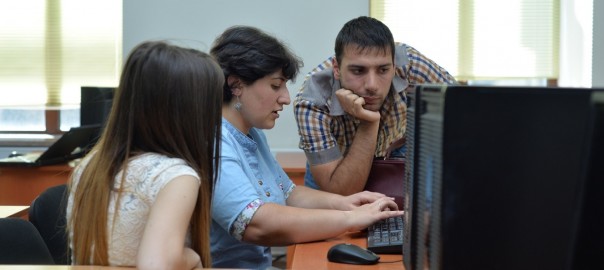
People from all walks of life have participated in the 'Boosting Technological Development in Shirak Marz' project – an EU-funded initiative implemented under the EU4Business initiative by the Microsoft Innovation Centre in Armenia, and aimed at meeting the demand of local IT companies by training the unemployed youth of Shirak to become junior developers.
Of the 80 students who passed the logic and math tests for admission to the first cycle, only around 45 proceeded to the second stage.
“It’s the natural process of weeding out,”says Sona Martirosyan, Education Projects Coordinator of Microsoft Innovation Centre. “When the course is free, a lot of the applicants just want to try it out, without having a clear perception of what computer science is and how much time and effort you need to put in.”
Sona Israelyan, one of the project’s students, who was offered the opportunity to become an intern immediately after the first stage, confirms: “At one point I realised that if I continued putting in as many hours as I was, I would simply have to drop out. I had to try harder to get somewhere: 8-10 hours a day instead of the 4-5 recommended by Microsoft. In part, I owe my success to my mentor, who was always available to answer questions – even when we wrote to him at the ungodly hours of the night. Especially in the internet age, when it’s easy to get scattered and choose all directions at once, guidance is crucial.”
Gyumri Technological Centre
An important part of the project was to set up the right environment. Gyumri Technological Centre, a regional centre for innovative technologies and IT, fits the mission well.
“In other marzes (regions of Armenia) implementing an initiative like this would be more difficult in the absence of a centre like this. Most of the time the students worked in teams of 4-5. Creating an atmosphere for teamwork and collaboration to foster the students’ passion for learning was significant to our project,” said Martirosyan.
For Sona Israelyan the location of the project was a big factor: she came back to her hometown Gyumri all the way from Russia, where she worked for her parents’ business for a few months. Before moving to Gyumri, Sona worked for some time in Aparan in Aragatsotn Marz.
“I lived and worked in Aparan for five years before deciding to come back where my friends, my city is. I feel tranquil here. I’m going to stay and work in Gyumri for sure. In Aparan, I had a high salary, great opportunities, but at a certain point, work got stagnant. There was nothing new to learn and nowhere to grow. I applied to transfer to the Gyumri branch, but that didn’t work out, so I handed in my resignation letter. They thought I had lost my mind, but I always warn employers at interviews, though sometimes they don’t take me because of it. When there are no new opportunities to learn, I just get up and go. Growth is my priority.”
High achievers
This curious combination of desire for incessant internal change and outer consistency always has the mark of goal-setters and achievers. It seems like coming back from Russia was worthwhile after all: Sona was one of the handful of students selected by local IT companies straight after the 6-month training stage and is working on projects that constantly require the acquirement of new skills.
“They picked one other girl and me from our group. The learning process continues. Programming for me is an art form: one is always looking for elegant solutions when tackling the next challenge. A lot of the time, I teach myself the necessary techniques for our projects. We’re working on a website for a tobacco company. Next one up is digitalising a taxi service. The specialty I chose is PHP, website programming. Another team is working on the app creation,” says Sona.
The specialties that students can pick, directly meet the IT sector’s demands: Java, PHP, and NET. The second stage of the project is an 'incubation lab', an opportunity for the students to apply the knowledge gained during the training period to practical programming problems especially set up by local IT companies to gauge the potential, and assess the skills of their future employees.
Demand from local companies
'Boosting Technological Development in Shirak Marz' also works with the IT companies of the region to find out their demand and support them in the creation of workplaces for the new specialists. GTC director Amalya Eghoyan predicts that Gyumri will become the high tech centre of the country. She says there is local demand for computer scientists, and the bright young people of the region need project like this to meet it.
The IT field in Armenia is gaining momentum, and the EU-funded project expects to have more than 200 employed junior developers in the Shirak Marz upon completion of its three training cycles. It’s not too late to join. The project’s results show that it's never too late to join the high tech revolution.
About the project
Funded by the EU under the EU4Business initiative, the ‘Boosting Technological Developments in Shirak Marz’ project supports economic development in the Shirak marz by boosting the skills of young unemployed, and business development of the IT community through training and financial assistance. The project develops intensive IT training courses for young job-seekers and carries out mentoring programmes bringing young people together with potential employers from the IT industry. The project supports IT companies in Shirak marz with a developed assistance package to increase their competitiveness.
